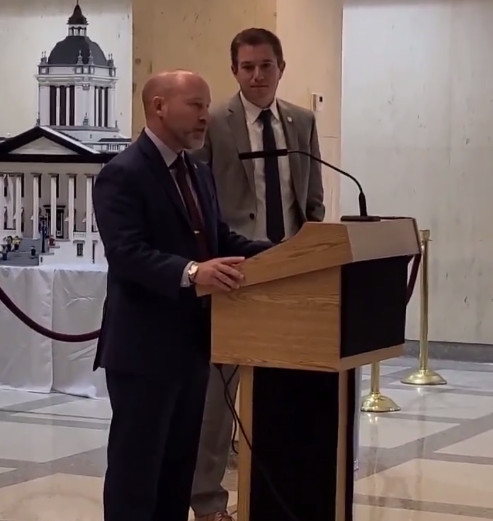Snow is a rarity in Florida, but it happens once in a great while in Tallahassee.
But an even rarer event that sometimes happens is a bill with bipartisan support. Even more scarce is the possibility that the bill is cannabis related.
Normally the sides start on nearly opposite ends of the spectrum and eventually work out enough comprises (mostly on the Democratic side) to get it through various committees and to the floor.
There are even rifts within each party, with progressives splitting from centrists on the left and libertarians parting from conservatives on the right.
That is one of the reasons that so little progress toward updated rules or a glitch bill have gained any ground since the implementation bill of Amendment 2 passed in 2017.
But the stars aligned during the last six months leading up to the 2022 session, and first term democratic representative Andrew Learned and second term republican representative Spencer Roach came together to break the years-long gridlock.

“The Legislature for the last five years has been trying to walk backwards on marijuana,” Learned said in an interview. “I would say today is the first step forward, and there will be more.”
The nuts and bolts of HB697
The bill has been designated HB 697 – An Act relating to regulating Marijuana, and these are the main actions of the 48-page bill.
- revising the course and examination requirements for qualified physicians and medical directors.
- prohibiting qualified physicians from engaging in certain advertising for their practices relating to marijuana for medical use.
- authorizing qualified physicians to perform patient examinations and evaluations through telehealth for renewals of physician certifications for the medical use of marijuana under certain circumstances, requiring a qualified physician to conduct a physical examination of each new patient before conducting any examination through telehealth and authorizing the use of telehealth to treat a qualified patient for the medical use of marijuana.
- revising the frequency with which qualified physicians must evaluate existing qualified patients for a physician certification for the medical use of marijuana.
- requiring that the physician certification pattern review panel consist of at least one qualified physician and revising the data that the panel is required to track and report.
- revising the frequency with which a medical marijuana use registry identification card must be renewed.
- prohibiting the Department of Health from renewing the license of a medical marijuana treatment center under certain circumstances.
- prohibiting medical marijuana treatment centers and certain other individuals and entities from employing qualified physicians or having direct or indirect economic interests in qualified physician practices and medical marijuana testing laboratories and prohibiting a certified medical marijuana testing laboratory from having an economic interest in or financial relationship with a medical marijuana treatment center.
- authorizing the department to sample marijuana from medical marijuana treatment centers for testing for specified purposes and authorizing the department to sample marijuana delivery devices from a dispensing facility to determine safety.
- requiring that a medical marijuana treatment center recall all marijuana, rather than only edibles, under certain circumstances.
- revising advertising requirements for medical marijuana treatment centers to prohibit radio and television advertising.
- creating the Medical Marijuana Testing Advisory Council adjunct to the department, requiring the department to provide staff and administrative support for the advisory council, providing for membership and meetings of the advisory council; requiring that members of the advisory council serve without compensation, providing those members are not entitled to reimbursement for per diem or travel expenses, requiring the advisory council to submit an annual report to the Governor and Legislature and requiring that such report be posted on the department’s website.
- authorizing the department and certain employees to acquire, possess, test, transport, and dispose of marijuana,
- requiring hemp extract and hemp extract products distributed in the state to be registered with the Department of Agriculture an Consumer Services; requiring the annual renewal of such registration, providing registration certificate application requirements, authorizing the department to analyze a sample of hemp extract or hemp extract product and inspect their labels to ensure compliance with certain requirements; requiring the department to deny registration certificate applications under certain circumstances; prohibiting the sale of hemp extract and hemp extract products intended for ingestion to persons under 21 years of age; authorizing the department to make certain determinations and issue final orders regarding unregistered hemp extract and hemp extract products; authorizing the department to issue and enforce stop sale orders and revoke or suspend the registration of any hemp extract or hemp extract product under certain circumstances and authorizing the department to impose a certain administrative fine.
The last one has many CBD shops, who have been selling Delta-8 products in large quantities, to be concerned. Will this block them from one of their biggest sellers? Will strong regulation cut off supply or raise costs? Some, like Comm. of Agriculture Nikki Fried, feel that it will bring greater consumer confidence.
Roach’s promise – no more THC cap bill.
The co-sponsors took to the floor of the rotunda last Friday to tout their bill.
Rep. Roach, who championed a 10% cap on THC in medical products for the last few years, took the time to quell the fears of many advocates during a 12/1 press conference by stating, “I think the political moment for THC caps has come and gone. The newer members coming into the Legislature seem to be younger and have a more libertarian bent, at least on the Republican side.”
How it changed, and could change again
However, it should be noted that an earlier iteration of the bill before it was filed contained a cap, but for “recreational use” products only, keeping medical products under the current rules. It was dropped because there are no legal recreational products to currently regulate. But that doesn’t mean he couldn’t put it back in some form with an amendment.
A clause for Employee protection against adverse workplace actions for having a medical card and using the product off site was removed, but Sen. Polsky in the senate and Rep. Greico in the House will be filing that as a separate bill.
But it remains to be seen if this bill will move forward. Even though Senators Gruters(R) and Jones(D) will be filing a companion bill in the senate, it still must be heard in all referred committees before it hits the floor. What it looks like when that happens will be interesting to see.

